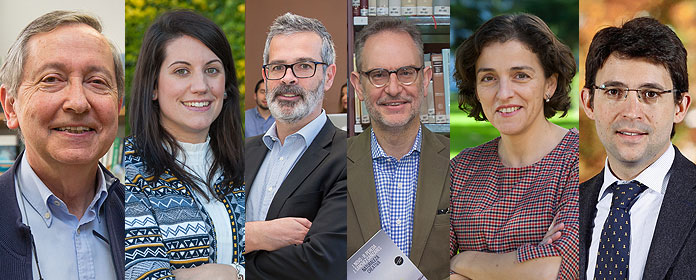Ten teaching methodologies for redesigning the university teaching in times of Covid-19
The University publishes a free e-book to draw shared learning from the crisis for the benefit of the university community

Turning the coronavirus crisis into an opportunity to redesign the teaching university. This is the challenge described in the book "teaching Rubic. Aprendizajes de la teaching universitaria en tiempos de la Covid-19", published by the University of Navarra. A dozen professors of the center describe in it their favorite active methodologies to convert the teaching into an autonomous learning experience of the student and achievable in a status of limited presence.
teaching Rubic is a short, non-academic book, result of a laboratory of ideas on how to enrich the university teaching beyond teaching in remote. "We wanted to turn our experience into a shared learning experience for the benefit of the entire university community," explained Santiago Fernández-Gubieda, director of the university's Reputation Unit and author of work.
The book gathers testimonials from teachers and students on how teaching can adapt to a scenario affected by reduced presence: with systems that seek student autonomy, critical thinking and problem-solving skills. His degree scroll makes reference letter to the famous three-dimensional mechanical puzzle. "It is a metaphor for the teaching 's eagerness to defragment learning and give meaning to knowledge; and it is also a game of possibilities, in each of which the teacher wants to find the best solution for student ," the book says.
Francisco Javier Novo, Full Professor of Genetics and professor at School of Sciences, describes the Team-based Learning (TBL) methodology. This technique favors work prior to class and active learning in small groups and outside of classroom. "Students learn from their peers through an argumentative process and acquire skills for work in teams, essential in their professional future," says the professor.
Sonia Lara, from the School of Education and Psychology, reveals to the reader the Thinking Routines or how to abandon the power point to return to the blackboard and record the conversations that have taken place during the class with the students. Álvaro Lleó, professor at Tecnun (School of Engineering), talks about Mentoring and explains the project Tu&Co, a personalized counseling program for the development of professional and personal skills. With this system, the student grows with financial aid from mentor.
From the School of Economic Sciences, Francesc Pujol encourages professor not to be afraid of conflict in projects and to give the leading role to student. Pujol introduces Collaborative Learning as a tool that financial aid to really understand the value of work in teams. Jaime Nubiola, professor at School of Philosophy and Letters, presents the University as a space where the professor and student learn to think and dialogue together freely and cordially. These are six of the ten methodologies about which students and teachers "talk" in the book, in addition to Project Based Learning, the Flipped Classroom or inverted class , the Case Method and Simulation professor.
Can the learning of student be reinforced through games? Marta Vidaurreta, professor at School Nursing, explains Gamification, a learning methodology that transfers the mechanics of games to the field of classroom and which she put on internship at the Simulation Center with an escape room activity. Tests with padlocks, puzzles, invisible ink, riddles, images, material from the discipline, codes..., were used to teach the subject Nursing Care in the Adult Person. The students participated jointly in the design, planning and implementation of the activity, which achieves a double goal: the development of leadership skills and learning from the internship.
An international webinar to reflect on the university teachingThe book, published by Eunsa, will be distributed free of charge in electronic format and will be available for download at available on June 30. On the occasion of this book, the University of Navarra has organized a webinar with Spanish-speaking university professors to share experiences and lessons learned about university teaching during the Covid-19 crisis. The event will be held next Tuesday, June 30 at 5 pm. Attendees will be sent the e-book.
Specifically, Pablo Sánchez-Ostiz, Vice President of Office of Academic Affairs of the University of Navarra; Pepa Sánchez de Miguel, director of the Quality and Innovation Service; Mikel Asensio Brouard, from department of Basic Psychology of the Autonomous University of Madrid; Esteban Romero, director of Participation and Social Innovation - Medialab of the University of Granada; Francisco Javier Novo, Full Professor of Genetics, of the University of Navarra; and Santiago Fernández-Gubieda, director of the Reputation Unit of the University of Navarra and author of the book. Those interested in participating in the webinar can formalize their registration at registration at the following address link.
Technical specifications of the bookdegree scroll: teaching Rubic. Learnings from the teaching university in times of the Covid-19.
Author: Santiago Fernández-Gubieda
Date: June 2020
publishing house: Eunsa
Promoted by: Center for University Governance and Reputation, University of Navarra.
Distribution: in two systems: PDF and ePub electronic format for electronic devices. Free distribution
